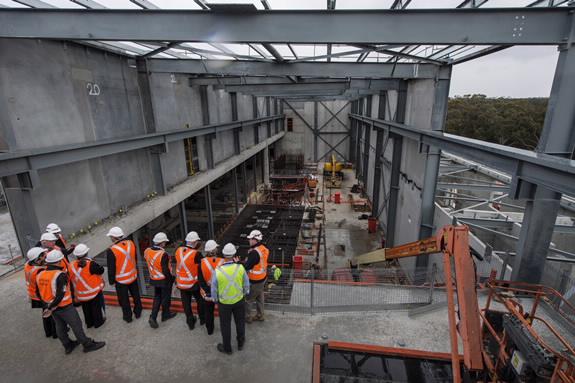

Published on the 29th September 2015 by ANSTO Staff
Australia is a step closer to becoming a global, high end manufacturer of nuclear medicines, with construction well underway on a brand new, $168 million ANSTO Nuclear Medicine (ANM) facility.
 |
| ANM Board members view the progress of construction on a tour of the new nuclear medicine manufacturing facility located at Lucas Heights. |
Engineers are celebrating the fact that the facility is out of the ground, large areas of the building are already waterproofed and the interior fit-out on track.
Importantly, work has also commenced on the hot cells, the technological engine room of the operation, which will enable production of the potentially life-saving medicine.
The new facility is being built at the Lucas Heights campus of Australian Nuclear Science and Technology Organisation (ANSTO), and will soon supply nuclear medicine to the world.
Today the facility was inspected by CEO of ANSTO, Dr Adi Paterson, Watpac Limited Managing Director, Martin Monro, and a number of ANM’s board members.
The project is being jointly delivered by ANSTO and a number of providers. Watpac Limited (Watpac) was awarded the $83 million design and construction contract in 2014.
With recent developments, ANSTO is significantly closer to massively increasing production of the radioisotope molybdenum-99 (Mo-99), which becomes a medicine called technetium-99m (Tc-99m).
That nuclear medicine is used in hospitals and medical centres for diagnosis of cancers and heart disease, and helps better understand treatments for conditions such as Parkinson’s and Alzheimer’s.
One in two Australians will benefit from a nuclear medicine procedure at some point in their lifetime. It is used to diagnose and treat a variety of life-threatening illnesses.
ANSTO CEO, Dr Adi Paterson, said the ANM facility is an example of how Australia is helping boost the worlds’ access to reliable sources of nuclear medicine.
“To give an idea of the project scale – this year ANSTO celebrated the fact that since 2008 our existing facility has produced four million doses of nuclear medicine for domestic supply,” said Dr Paterson.
“Once this facility is operational and running at full scale next year – we estimate we will be producing more than 10 million doses a year, which is more than a quarter of the world’s demand.
“And that medicine will be produced with Low Enriched Uranium, contributing significantly to both international health systems and Australia’s nuclear non-proliferation goals.”
Watpac Managing Director, Martin Monro, said that Watpac is proud to be part of a project instrumental to saving lives.
“We are privileged to be working with ANSTO to deliver an important project for the scientific and health industry not only in Australia, but also the world,” Mr Monro said.
“Our team has a solid track record in the design and construction of leading health infrastructure and we are excited to see this latest milestone make a significant step towards completion of what will be a world-class facility.”